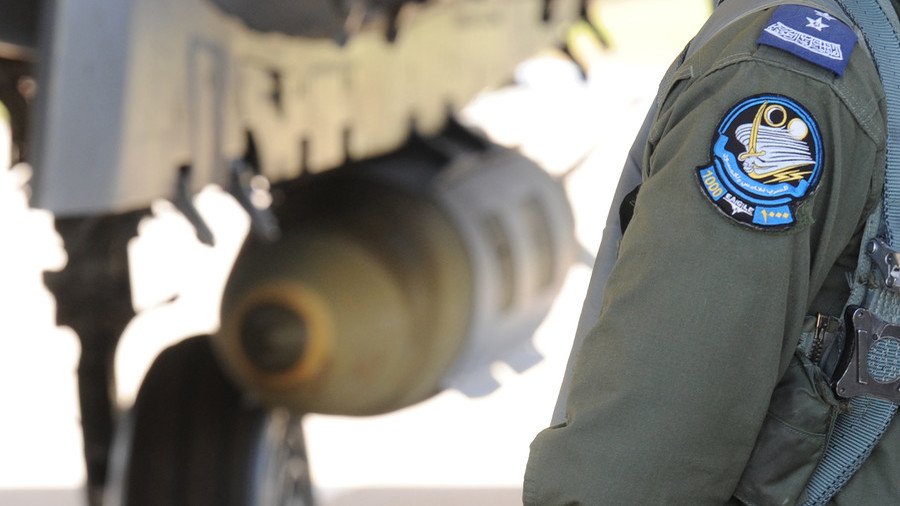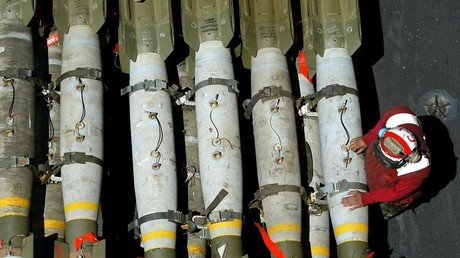Saudis ‘don’t know how to use’ US bombs: Trump condemns deadly Yemen school bus strike… kind of

It wasn’t the US-made bomb, but rather the Saudi military’s inability to properly use the munition –despite all the American training– that led to the “horror show” bombing of a Yemeni school bus in August, Donald Trump has said.
A Saudi-led coalition airstrike on a school bus, that killed 40 children and maimed dozens of others in the busy market town of Dhahyan in northern Yemen on August 9, is not Washington’s fault, Donald Trump stated in an interview with Axios on Sunday.
Despite the fact that pieces of a 500-pound (227 kilogram) laser-guided MK 82 bomb made by Lockheed Martin were found at the site of the explosion, Trump shifted the blame for the tragedy to the coalition’s inability to use the US-supplied weapons properly.
“That was basically people that didn’t know how to use the weapon, which is horrible,” Trump said, calling the widely circulated footage from the bombing a “horror show.”
“I think it's a terrible situation. I hated seeing what happened with the bus and the children cause that's pure – that's a horror show when you see a thing like that, you saw the bus,” he said, stressing that “bother's not a strong enough” word to describe the disgust he felt watching the tragedy.
When asked by the interviewers if the US should halt selling weapons to their Middle Eastern ally amid continuous reports of an indiscriminate Saudi-led bombing campaign, Trump replied: “We're looking at Yemen very carefully right now. We are actually studying Yemen very, very carefully.”
“I'll be talking about a lot of things with the Saudis...but certainly I wouldn't be having people that don't know how to use the weapons shooting at buses with children,” Trump added.
President Trump to #AxiosOnHBO on Saudi use of U.S.-made weapons on civilians: "That was basically people that didn't know how to use the weapon." @HBODocspic.twitter.com/ZsxDxdzjNu
— Axios (@axios) November 5, 2018
While the school bus attack, for which the Saudi-led coalition reluctantly admitted responsibility in September, is just one of many bombings that claimed ‘collateral’ civilian lives in Yemen, the Western powers remain hesitant to end weapons supplies to Riyadh. Since the start of the Saudi-led bombing campaign in March 2015, Human Rights Watch alone identified US-made munitions at the sites of at least 24 other strikes in Yemen.
READ MORE: Starving Yemeni girl from shocking NYT photo dies as bombing & blockade continues
The Pentagon, however, maintains that they are not to blame for the Coalition ‘mistakes’, despite the fact that the US provides training for the Saudi coalition in the use of their weaponry. Americans also provide aerial refueling and intelligence for Saudi jets attacking Yemeni targets. Secretary of Defense James Mattis, however, stressed following the August tragedy that, while the US military helps with “planning,” it does not provide “dynamic targeting” information to the Saudis.
Yet despite what Trump called lack of skill in the use of American weapons, the Saudis continue to stock up on American bombs. As part of the $110 billion deal signed with the US last year, Riyadh reportedly ordered some $7 billion worth of precision-guided weapons from Raytheon and Boeing.
In the wake of resumed pressure on Western powers to end weapons shipments to the country following the murder of Washington Post columnist Jamal Khashoggi in Istanbul last month, Trump has made it clear that he wants to preserve arms contracts with the Saudis. At the same time, somewhat hypocritically, Washington this week called for an end to hostilities in Yemen.
Official UN figures say that more than 10,000 people have been killed in Yemen since the Saudi-led bombing campaign began in March 2015. But the Armed Conflict Location & Event Data Project (ACLED) believes that at least 56,000 people have lost their lives in the war. The violence has also left around two-thirds of Yemen’s population of 27 million relying on aid amid an ongoing strict naval and aerial blockade.
Think your friends would be interested? Share this story!















